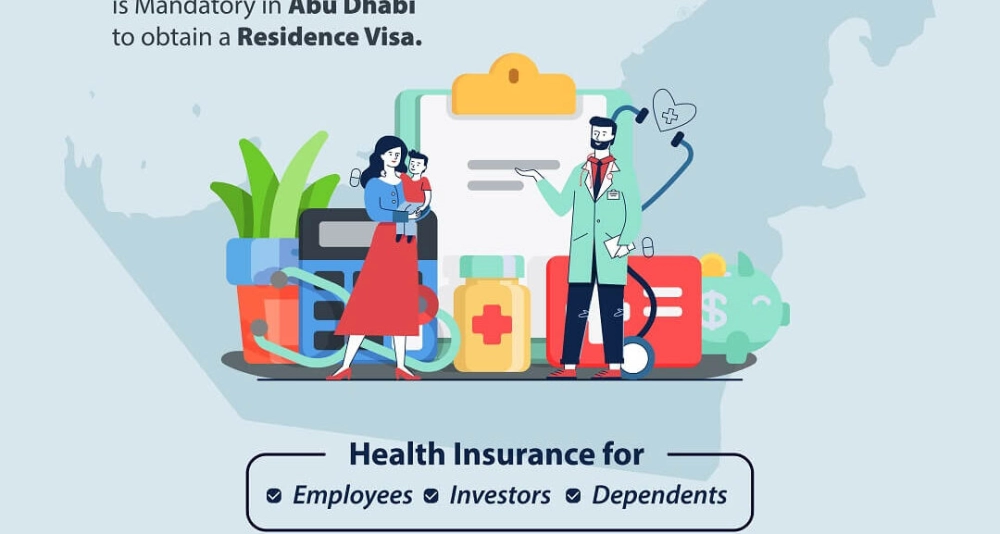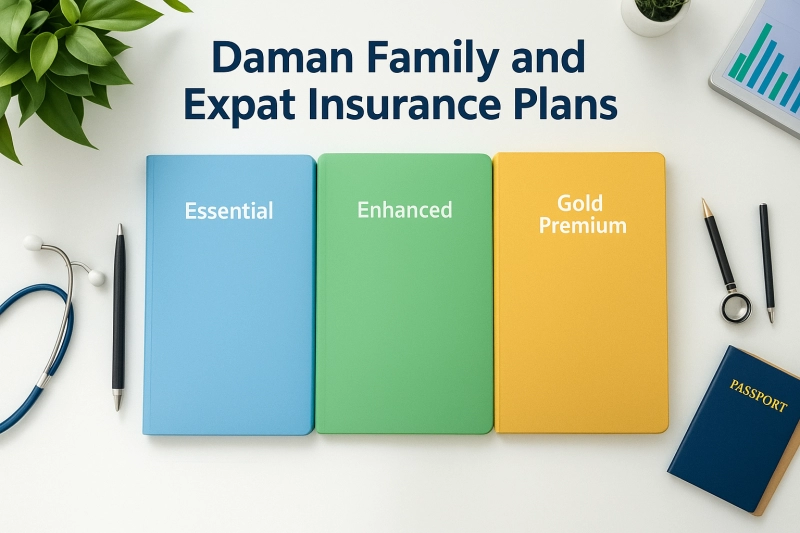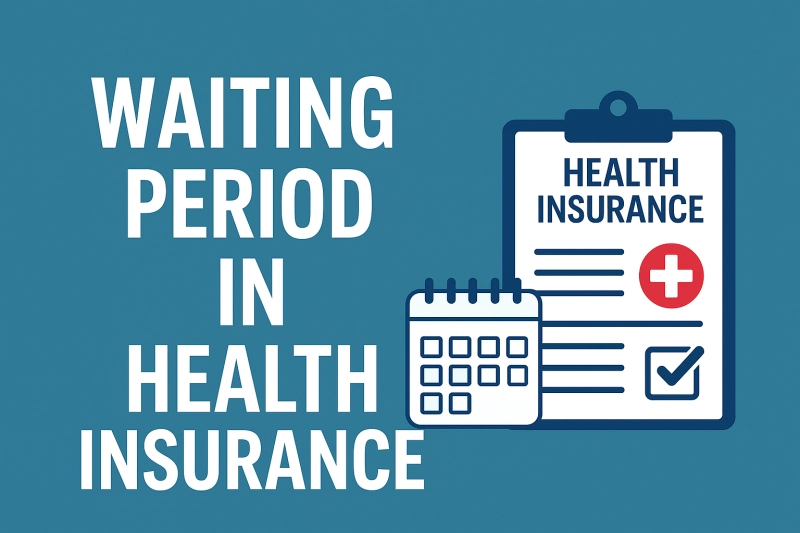Trying to make sense of Daman's health insurance plans can feel a little overwhelming at first. With all the different policy names and benefit lists, it's easy to feel like you're trying to read a map without a key.
But there’s a simpler way to look at it. Think of the plans like different travel classes on an airline, each one is built for a specific journey, budget, and level of comfort. This simple trick helps you cut through the noise and quickly see which category fits your needs, whether you just need the basics to meet legal requirements or a premium plan for comprehensive global protection.
So, let's break down these tiers, starting with the most essential and working our way up to the most expansive options Daman offers.
Quick Comparison of Daman Health Insurance Coverage Scope
To get a quick sense of where you might fit, here’s a high-level look at the main plan categories. This table will help you pinpoint which tier to explore further based on who you are and what you need from your coverage.
| Plan Tier | Ideal For | Daman Health Insurance Coverage Scope | Key Feature |
| Basic | Lower-income employees and those needing legally compliant, budget-friendly coverage. | Essential inpatient and outpatient services within a defined network. | Affordability and compliance with UAE mandatory health insurance laws. |
| Enhanced | Professionals, expat families, and individuals seeking a balance of cost and benefits. | Broader network access, higher limits, and often includes maternity, dental, and optical. | Added flexibility and more comprehensive benefits beyond the essentials. |
| Premier | Senior executives, high-net-worth individuals, and anyone needing top-tier global coverage. | Elite worldwide network of hospitals and specialists with very high annual limits. | Comprehensive global coverage with extensive premium benefits. |
This table is just a starting point, of course. The best way to find your perfect fit is to dive into the details of what makes each tier unique.
Basic Plans: Daman Health Insurance Coverage
Think of Daman's Basic plans as your Economy ticket. Their main job is to get you where you need to go safely and affordably, ticking all the boxes for mandatory health insurance in the UAE. These plans are a perfect fit for anyone on a tighter budget, like lower-income employees, who need solid, compliant coverage without any expensive extras.
Coverage here is focused squarely on the essentials—inpatient hospital stays and outpatient clinic visits within a specific, often more limited, network of providers. While the annual benefit limits are lower than in higher tiers, they’re designed to provide a reliable safety net for common medical needs and emergencies.
"It's important to remember that these plans aren't "lesser" in quality; they're just more focused. They deliver exactly what the law requires, making sure everyone has access to necessary medical care without facing financial hardship for routine treatments."
The biggest advantage is affordability. The premiums are kept low, which makes these daman health insurance plans accessible to everyone. This tier is truly the workhorse of the system, ensuring widespread protection for the community.
This infographic gives you a simple visual of how the Daman plans are structured, showing how each tier builds on the one before it.
As you can see, moving up the ladder means more benefits and a higher premium, giving you a clear path if you decide to upgrade your coverage later on.
Enhanced Plans: Daman Health Insurance Coverage (Business Class for Families and Professionals)
Ready for an upgrade? The Enhanced plans are the Business Class of Daman's offerings. This tier delivers a lot more comfort, flexibility, and a much wider range of benefits. It's the go-to choice for professionals, expat families, and anyone who wants more than just the bare-bones essentials.
Enhanced plans typically come with some significant perks:
- A broader network: You get access to a much larger list of hospitals and clinics, including many well-respected private facilities.
- Higher annual limits: This gives you a more substantial financial cushion for medical expenses over the year.
- Added benefits: Coverage often extends to important services like maternity, dental, and optical care, which are usually not included in Basic plans.
- Regional coverage: Many plans in this tier offer protection across the GCC or other specific regions, which is perfect for people who travel for work or fun.
These plans strike an excellent balance between cost and comprehensive protection, making them one of the most popular options around. You can dig into the specifics by checking out a detailed Daman health insurance plan breakdown to see if it’s the right match for your family.
Premier Plans: Daman Health Insurance Coverage (The First-Class Experience)
Finally, we arrive at the top: the Premier plans. These are the First-Class ticket of health insurance. They are designed for senior executives, high-net-worth individuals, and anyone who wants the absolute best healthcare coverage with zero compromises. The standout feature here is almost always worldwide coverage, giving you total peace of mind no matter where you are in the world.
Yes, the premiums are higher, but they unlock an exceptional level of service. This includes access to an elite network of top-tier hospitals and specialists, both in the UAE and internationally. The annual limits are incredibly generous—often reaching into the millions of dirhams—ensuring even the most expensive treatments are covered. You’ll also find that perks like alternative therapies and preventive health screenings are standard.
What Your Daman Plan Actually Covers
It’s one thing to read a shiny brochure, but what really matters is knowing how your health plan works when you actually need it. Let's cut through the insurance jargon and talk about what your Daman policy means in the real world.
At its heart, your Daman policy is built on two main pillars of healthcare: inpatient and outpatient services.
Here’s a simple way to think about it:
- Inpatient care is for the serious stuff—medical situations that require you to be formally admitted to a hospital to stay overnight or longer. This could be for a major surgery, a sudden illness, or a serious accident.
- Outpatient care covers everything else you do without being admitted. Think of your regular doctor's appointments, lab tests, and trips to the pharmacy for prescriptions.
Getting this distinction is the first step to really understanding your coverage. While both are critical, your plan will handle them differently, especially when you compare Basic, Enhanced, and Premier tiers.
The Foundation: Inpatient Coverage
Inpatient care is the absolute core of any daman health insurance plan. It’s your ultimate safety net, there to protect you from the staggering costs that can come with a hospital stay. When your policy mentions "inpatient benefits," it's talking about a bundle of services you receive during a hospital admission.
This almost always includes:
- Hospital Accommodation: The cost of your room, which will vary depending on your plan (e.g., a private room versus a semi-private one).
- Surgical Procedures: Covers the surgery itself, from the surgeon’s fees to the operating room charges.
- Anesthetist Fees: The cost for the specialist managing your anesthesia.
- Diagnostic Tests: Any X-rays, MRIs, or lab work needed while you're in the hospital.
- Medications: The drugs administered to you during your stay.
"For instance, if you suddenly need an emergency appendectomy, your inpatient coverage kicks in. It would handle the ER visit that led to your admission, the surgery, your hospital room for recovery, and the medicine you receive before going home. This is the kind of protection that stops a medical crisis from becoming a financial one."
Everyday Healthcare: Outpatient Benefits
While inpatient care is for the big, unexpected events, your outpatient benefits are for managing your health day-to-day. This is the part of your plan you'll probably use the most. It helps you stay healthy and catch small problems before they become big ones.
Outpatient services generally cover:
- Consultations: Visits to your General Practitioner (GP) or specialists like dermatologists and cardiologists.
- Diagnostics: Lab work, blood tests, and imaging scans ordered by your doctor.
- Prescription Drugs: The medications you pick up from the pharmacy.
- Physiotherapy: Treatment to help you recover from an injury or surgery.
The main difference here is often how you share the cost. For most outpatient services, you'll have a co-payment—a fixed fee or percentage you pay for each visit or service. You might pay AED 50 for a specialist visit, and Daman covers the rest. You’ll find these exact figures laid out clearly in your policy documents.
Beyond the Basics: Dental, Optical, and Maternity
For many people, good healthcare goes beyond standard doctor visits. This is where Daman's Enhanced and Premier plans really show their value, often bundling in popular benefits for dental, optical, and maternity care.
Maternity Coverage A must-have for growing families, this benefit usually covers:
- Prenatal check-ups and consultations.
- The costs for a normal delivery or a medically necessary C-section.
- Postnatal care for both mother and baby for a set period.
One crucial detail to watch for is the waiting period. Most insurers require you to have the policy for a specific time (often 6-12 months) before you can claim maternity benefits.
Dental and Optical Care These are easily some of the most requested add-ons.
- Dental coverage can range from basics like check-ups, cleanings, and fillings to more complex procedures like root canals.
- Optical coverage typically helps pay for eye exams and gives you an allowance for prescription glasses or contact lenses.
These specialized benefits are especially valuable for businesses wanting to offer a competitive benefits package. If you’re curious about how these are bundled for corporate clients, you can dive into our detailed guide on Daman group medical insurance. Understanding all your options is the best way to make sure you and your team are fully protected.
Let's face it, talking about money is a huge part of choosing health insurance. So, how much is a Daman plan actually going to cost? It's not a one-size-fits-all number. The final premium you pay is a mix of several key details about you and the level of coverage you want.
Think of it this way: an insurer is trying to figure out the likelihood that you'll need medical care. This isn't just a random guess; it's a calculated assessment based on your personal details and the specific plan you choose. Understanding these moving parts is the secret to getting the right protection without any nasty surprises on your bill.
What Goes Into Your Daman Premium?
Your insurance premium is like a custom order. Every feature you add or tweak changes the final price. Naturally, the more benefits and flexibility you want, the more it will cost.
Here are the main things that determine your final premium for any of the daman health insurance plans:
- Age and Health: This is a big one. Younger folks usually pay less because, statistically, they need less medical attention. Older members or those with pre-existing conditions will naturally see higher premiums to reflect the increased risk.
- Plan Tier and Benefits: This has the biggest impact on cost. A Basic plan covering the essentials will be much easier on the wallet than a top-tier Premier plan that includes worldwide access, dental, and optical care.
- Geographical Scope: A policy that covers you only within the UAE is going to be cheaper than one offering international or worldwide protection. If you travel a lot, that extra cost is what buys you peace of mind on the road.
- Network Type: Access to a limited, or "restricted," network of hospitals and clinics will lower your premium. Plans with a comprehensive network that includes premium, high-end facilities will cost more.
"The bottom line is simple: broader coverage means a higher premium. Your goal is to find that perfect balance where the benefits you get are worth the price you’re comfortable paying."
Let's break down the key variables that Daman (and most insurers) look at when calculating what you'll pay.
Factors Influencing Your Daman Premium
| Factor | How It Impacts Your Premium | Example |
| Age | Younger individuals generally pay lower premiums. Costs increase with age. | A 25-year-old will have a significantly lower premium than a 55-year-old for the same plan. |
| Plan Tier | Higher-tier plans (like Premier) with more benefits cost more than lower-tier plans (like Basic or Enhanced). | Adding comprehensive dental and optical benefits will increase the annual premium. |
| Network | A broad, comprehensive network including premium hospitals is more expensive than a restricted network. | Choosing a "Restricted Network 4" plan will be more affordable than a "Comprehensive Network 1" plan. |
| Coverage Area | Worldwide coverage costs more than regional (GCC) or UAE-only coverage. | A frequent traveler might pay extra for a "Worldwide excluding USA/Canada" add-on. |
| Deductible | Choosing a higher deductible (the amount you pay first) will lower your annual premium. | A plan with a Dhs 1,000 deductible will be cheaper than one with a Dhs 0 deductible. |
| Add-Ons | Optional benefits like wellness checks, alternative medicine, or enhanced maternity cover will add to the cost. | Adding a "Wellness Package" that includes regular health screenings will increase the total price. |
Getting a handle on these factors gives you the power to adjust the levers and build a plan that truly fits your budget and lifestyle.
Getting Familiar with the Lingo
When you get your policy documents, you'll see a few financial terms pop up again and again. Knowing what they mean is key to understanding what you'll have to pay out-of-pocket.
- Deductible: This is the amount you pay for your healthcare first, before your insurance kicks in. For example, if your plan has an annual deductible of AED 1,000, you’re responsible for the first AED 1,000 of your medical bills that year.
- Co-payment (or Co-insurance): This is the slice of the bill you pay for a specific service. It might be a fixed amount (like AED 50 for a specialist visit) or a percentage (you pay 20% of the total cost). You’ll see co-payments most often for things like doctor visits and prescriptions.
- Annual Limit: This is the absolute maximum amount your insurance plan will pay for your care in a single year. The higher-tier plans come with massive annual limits, giving you a much stronger financial safety net in case of a serious medical event.
Putting It All Together: A Family Example
Let's see how these choices play out for a hypothetical family of four, with two adults in their late 30s and two young kids.
- Scenario A (Budget-Conscious): This family goes for an Enhanced plan with a restricted network and regional coverage. They accept a small deductible and standard co-payments. Their annual premium is reasonable, giving them solid, dependable coverage for everyday health needs and emergencies within the GCC.
- Scenario B (Benefit-Focused): The same family decides on a Premier plan. They want a comprehensive, worldwide network, zero deductible, and low co-payments. They also add the best dental and optical benefits available. Their premium is significantly higher, but in return, they get elite healthcare access anywhere in the world with almost no out-of-pocket costs.
As you can see, every single choice you make directly shapes the final cost. By carefully thinking about your family's health, travel habits, and budget, you can design a Daman plan that’s the perfect match.
Making Sense of the UAE Health Insurance Market
To really get a feel for what makes a Daman health insurance plan a solid choice, it helps to zoom out and look at the bigger picture. The UAE's health insurance market isn't just growing; it's being actively shaped by a national mission for top-tier healthcare and strict laws that make coverage mandatory. This isn't just about shuffling papers—it's a real shift toward making sure every single resident has strong health protection.
This forward-thinking approach means insurance has gone from a "nice-to-have" to a legal must-have for getting or renewing a visa in major hubs like Abu Dhabi and Dubai. The result? A bustling, competitive market where insurance companies have to offer genuine, compelling value to win your business.
Why Strong Coverage Is Non-Negotiable
When you see this market context, it becomes crystal clear why a comprehensive Daman plan is so valuable. It’s built to meet the high standards of a country that puts its residents' health first. While Daman champions modern, digital-first tools like apps for managing claims and policies, it's good to remember that the wider healthcare system is still a mix of the old and the new. For instance, the process of submitting healthcare forms, which in some systems still involves faxing, can sometimes feel a bit traditional.
This contrast just highlights the UAE's impressive forward momentum. Choosing a solid Daman plan means you're doing more than just following the law. You're buying into a system designed from the ground up for high-quality, accessible, and modern healthcare, ensuring you’re ready for whatever comes your way.
Ready to find the perfect Daman plan without the hassle? The experts at InsuranceHub.ae are here to help you compare quotes, understand benefits, and secure the right coverage online in just a few clicks. Visit https://insurancehub.ae to get started.







